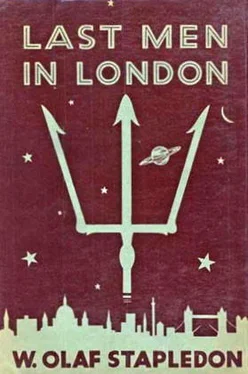There was one sphere in which several of these beings did earnestly try to make themselves felt, namely in politics and social improvement. But here they were even more ineffective than elsewhere. They could never see the importance of the accepted political aims or the validity of the recognized party maxims. When politicians demonstrated the inevitable results of this policy or that, these unhappy misfits could only deplore their own stupidity in not being able to follow the argument. When they themselves confessed how they would deal with some problem or other, they were either cursed for their lack of true feeling or derided for their childish idealism. In either case they were charged with being ignorant of human nature; and this charge was, in a manner, just, for they had seldom any conception of the gulf between themselves and the members of the older species.
I have been speaking of those few who were educated so far as to be able to take thought for matters of theoretical interest or public concern. But the great majority never attained this level. Those who were born into comfortable circumstances generally came into conflict with the taboos of their society, and were ostracized; so that they sank into the underworld. Those also who were born into poor families were frequently outlawed by their fellows; and being entirely unfit to make their way in the huge dog-fight of industrialism, they nearly always subsided into the humblest occupations. They became dock-labourers, charwomen, agricultural labourers, clerks of the lowest order, very small shop-keepers, and especially vagrants. It was remarkable that they received on the whole more sympathy and understanding in the lower than in the higher reaches of society. This was because in the simpler, less sophisticated, manner of life their native intelligence and integrity did not come into obvious conflict with the proud but crude culture of more ‘educated’ folk. Indeed, those whose lot fell among the ‘lower’ classes of society were generally treated by their peers with a strange blend of contempt and respect. Though they were regarded as ineffective cranks or freaks, as children whose development had somehow been arrested, as ‘daft’, ‘fey’, ‘mental’, they were also credited with an odd kind of impracticable wisdom that was too good for this world. Not only so, but even in practical matters their advice was often sought; for they seemed to combine a divine innocence and self-disregard with a shrewdness, a cunning, which, though it was never used for self-advancement, struck the normal mind as diabolic.
The kind of life into which these abortive supermen gravitated most frequently was a life of wandering and contemplation. Often they became tramps, drifting from one big town to another, trekking through agricultural districts, tinkering, sharpening scissors, mending crockery, poaching, stealing, breaking stones, harvesting. A few became postmen, others drivers of motor vans or buses; but though, whatever their occupations, they worked with incredible efficiency, seldom could they remain for long in posts which entailed subordination to members of the normal species. The women were more unfortunate than the men, for vagrancy was less easily practised by women. Some became seamstresses. A few, protected by sexual unattractiveness, faced the difficulties and dangers of the road. Others, blessed with more or less normal looks, chose prostitution as the least repugnant way of earning a livelihood.
Our observers, whenever they studied these unfulfilled approximations to a new species, found invariably a mental pattern definitely far superior to the normal, but also one which was much less developed than that of the Second Men, whose career was destined to begin some ten million years after your day. These superior contemporaries of yours had indeed, for beings whose heads were not much larger than your own, remarkable intelligence. They were remarkable also in respect of the organization and unity of their minds. Where the normal personality, torn by conflicts of desire and loyalty, would split into two or more incomplete systems imperfectly related to one another, these preserved their integrity, and chose that action which did in fact offer the greatest good possible in the circumstances. They were almost entirely without selfishness, for they had a capacity for self-insight definitely more penetrating than that of the normal species. Like the Second Men, they had also an innate interest in the higher mental activities, a craving for intellectual exercise and aesthetic delight no less imperious than the simple needs for food and drink. But unfortunately, since they were isolated individuals overwhelmed in childhood by a world of inferior calibre, they were unable to satisfy these cravings wholesomely. They were like potential athletes trained from birth to use certain muscles in grotesque and cramping actions, and the rest of their bodies not at all. Thus they never developed their powers, and were haunted by a sense of falsity and futility in all their mental life. They were beings, moreover, in whom we found a vigorous and lucid innate loyalty toward the supreme adventure of the awakening spirit in man, and in the cosmos. They were very ready to regard themselves and others as vessels, instruments of a great corporate endeavour. But, unfortunately, in their terrible spiritual isolation from their neighbours, they could never whole-heartedly give themselves to the communal life. In spite of the contempt with which they were treated, in spite of their own confusion of mind, those of them who survived beyond the age of twenty-five or thirty could not but observe that the minds of their fellow-men were woven upon a different pattern from their own, a pattern at once cruder and more confused, less intricate yet more discrepant. Moreover, they soon found reason to suspect that they themselves alone had the cause of the spirit at heart, and that the rest of the world was frivolous. Each of them was like an isolated human child brought up by apes in the jungle. When at last he had begun to realize the gulf between himself and others, he realized also that he had been damaged past repair by his simian upbringing. In these circumstances he would, as a rule, content himself with a life of personal kindliness and humour, which was ever rooted in the strength of his own unshakable ecstasy of contemplation.
It so happened that one of these rare beings was sent by his parents to the school where Paul was head master. In appearance he was a great lout rather like a grotesque child of eight seen through a magnifying-glass. His thick neck and immense, almost bald head, was very repulsive to the normal eye. Only the hinder part of his head bore hair, which was sparse, wiry, and in colour like grey sand. The bare and lumpy dome of his cranium overhung two pale brown eyes, so large that they seemed to occupy the whole middle region of his face. Beneath an inconspicuous nose was a huge and clear-cut mouth. So small was the lower jaw that the chin, though well moulded, seemed but another nose under the great lips. The head was held erect in the attitude of one supporting a pitcher on his crown. This carriage gave to the face a farcical dignity which the alert and cautious eyes rendered at times malignant. The thick-set body and great restless hands made women shudder.
No wonder that this unfortunate child, who received the nickname Humpty, was persecuted by his schoolfellows. In class his laziness was relieved now and then by fits of activity, and by uncouth remarks which roused derision among the boys, but which to Paul were sometimes very disturbing. The form master at first reported that Humpty was stupid and incorrigibly indolent; but later it appeared that he was perpetually active either in remote meditations or in observing and criticizing everything save the work in hand. Puzzled by the lad’s seeming alternation between stupidity and brilliance, Paul contrived to give the whole class a series of intelligence tests. Humpty’s performance defeated analysis. Some of the simplest tests floored him, yet some of those’ intended for ‘superior adults’ he solved without hesitation. Inquiring into the failures in the low-grade tests, Paul found that they were always due to some subtle ambiguity in the problem. The psychologists were not intelligent enough to test this unique boy.
Читать дальше












